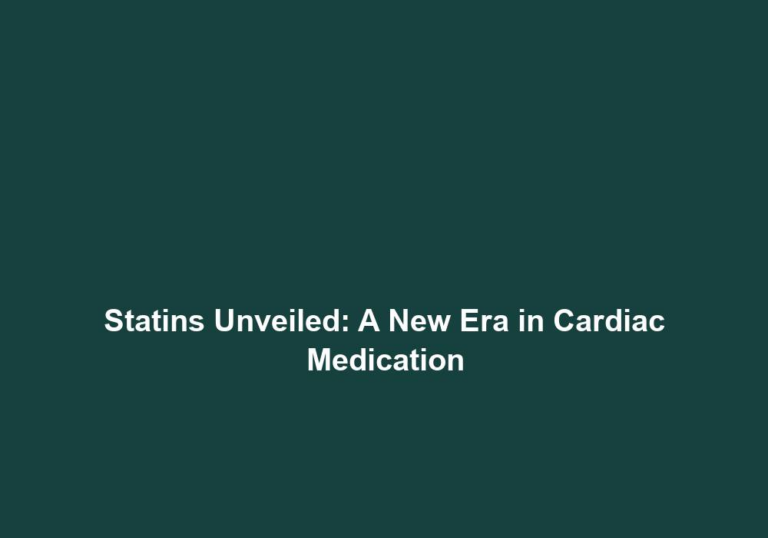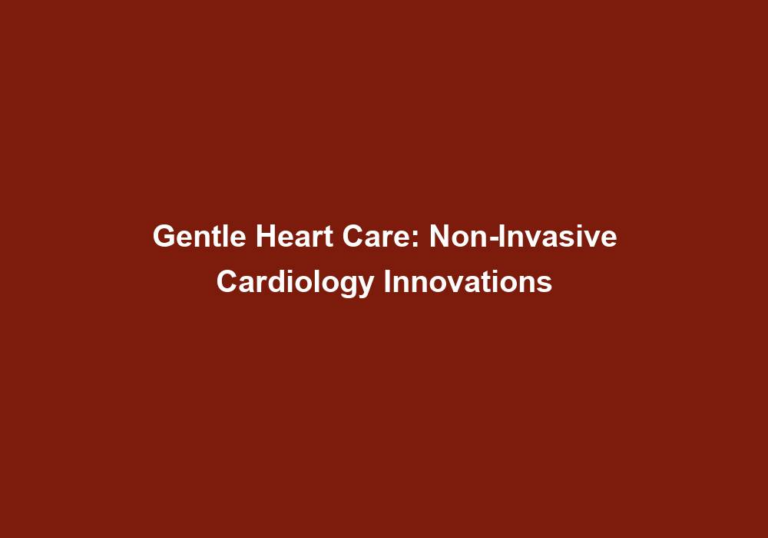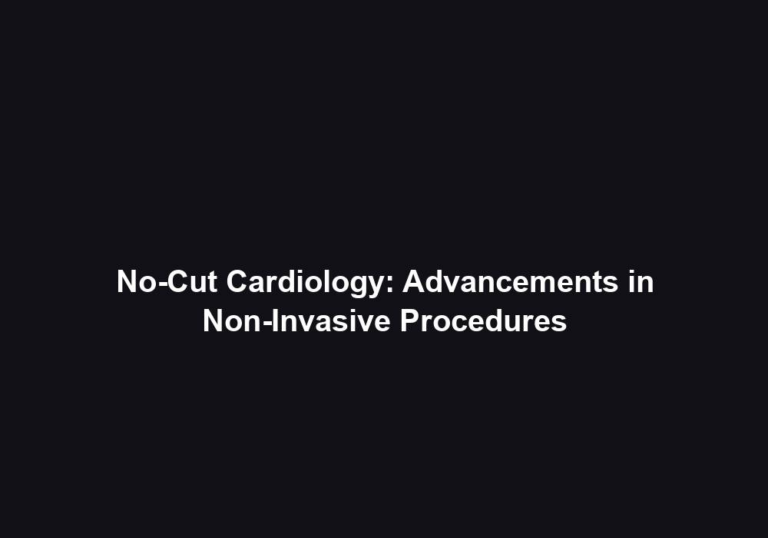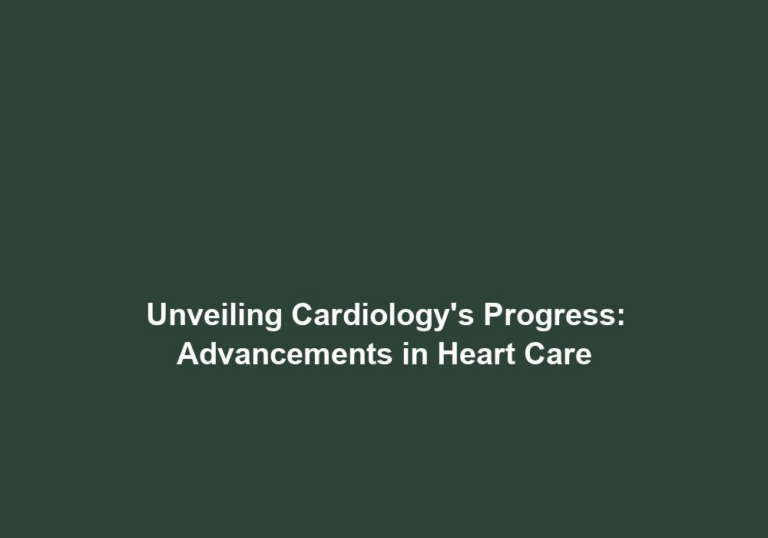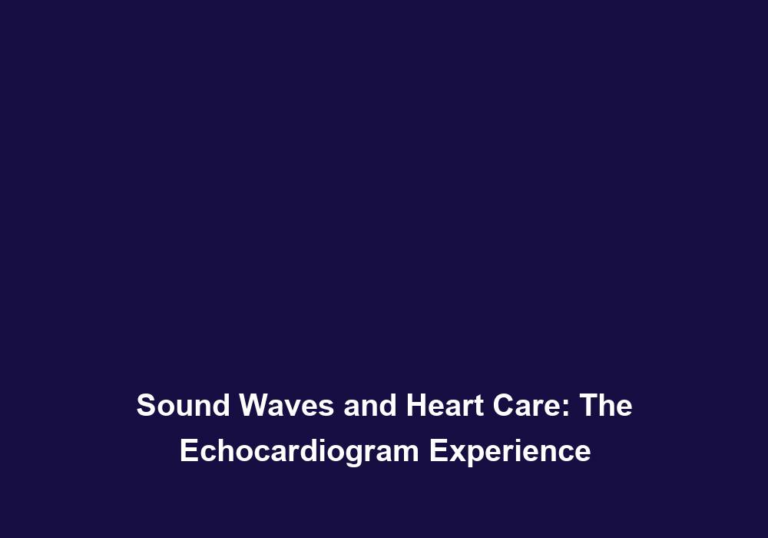Pills for Your Heart: The Advancements in Cardiology
The field of cardiology has witnessed remarkable advancements in recent years, particularly in the development of medication aimed at improving heart health. These groundbreaking pills have revolutionized the treatment and management of various cardiovascular conditions. In this article, we will delve into the latest advancements in cardiology, focusing specifically on the incredible pills that have emerged as lifesavers for patients worldwide.
The Importance of Cardiology Medication
Cardiovascular diseases, including heart attacks, strokes, and high blood pressure, are among the leading causes of death globally. Given the prevalence of these conditions, the importance of effective cardiology medication cannot be overstated. These pills play a pivotal role in preventing and managing heart-related ailments, helping patients lead healthier and more fulfilling lives.
Cardiology medication is crucial as it helps address the underlying causes and symptoms of cardiovascular diseases. These medications are designed to target specific mechanisms in the body that contribute to the development and progression of heart conditions. By addressing these factors, cardiology medication can effectively reduce the risk of heart attacks, strokes, and other cardiovascular events.
Furthermore, cardiology medication is essential in managing risk factors such as high cholesterol levels and high blood pressure. By controlling these factors, patients can significantly lower their chances of developing heart-related complications. Medications like statins and beta-blockers are specifically formulated to address these risk factors and provide long-term benefits in maintaining heart health.
In addition to managing existing conditions, cardiology medication also plays a crucial role in preventing the onset of cardiovascular diseases. By prescribing medications like antiplatelet agents, healthcare professionals can reduce the risk of blood clots and subsequent heart attacks or strokes. These preventive measures can have a significant impact on patients’ overall well-being and reduce the burden of cardiovascular diseases on society.
Advancements in Cardiology Medication
- Statins: Statins have emerged as a cornerstone in the treatment of high cholesterol levels and reducing the risk of heart attacks and strokes. These medications effectively lower LDL (low-density lipoprotein) cholesterol levels, commonly referred to as bad cholesterol, thereby reducing the deposition of plaque in the arteries. This breakthrough has significantly reduced the incidence of heart diseases.
Statins are widely prescribed due to their proven efficacy in reducing LDL cholesterol levels. They inhibit the enzyme responsible for cholesterol production in the liver, leading to a decrease in circulating cholesterol levels. By doing so, statins not only reduce the risk of plaque formation in the arteries but also stabilize existing plaques, making them less likely to rupture and cause a heart attack or stroke.
Moreover, statins have demonstrated additional benefits beyond cholesterol management. These medications have been shown to possess anti-inflammatory properties, which can help reduce arterial inflammation and improve overall cardiovascular health. Some statins also have antioxidant effects, further enhancing their positive impact on heart health.
- Antiplatelet Agents: Antiplatelet medications, such as aspirin and clopidogrel, have become integral in the management of cardiovascular diseases. By preventing blood platelets from clumping together and forming clots, these drugs reduce the risk of heart attacks and strokes. Aspirin, in particular, is widely recommended for individuals with a high risk of cardiovascular events.
Antiplatelet agents work by inhibiting the activation of platelets, which are responsible for forming blood clots. By preventing platelet aggregation, these medications help maintain the integrity of blood vessels and reduce the likelihood of blockages that can lead to heart attacks or strokes. Aspirin, the most commonly used antiplatelet agent, is easily accessible, affordable, and has a well-established safety profile, making it a preferred choice in many cases.
In recent years, newer antiplatelet agents, such as clopidogrel and prasugrel, have gained prominence due to their increased effectiveness and reduced side effects. These medications are often prescribed to individuals who are at a higher risk of cardiovascular events or have experienced a previous heart attack or stroke. The continuous development of antiplatelet agents aims to provide patients with more targeted and personalized treatment options.
- Beta-Blockers: Beta-blockers are widely prescribed to patients with high blood pressure, heart failure, and certain arrhythmias. These medications work by blocking the effects of adrenaline and other stress hormones on the heart, resulting in lowered heart rate and blood pressure. Beta-blockers effectively reduce the workload on the heart, improving its overall function and reducing the risk of complications.
Beta-blockers exert their therapeutic effects by binding to beta-adrenergic receptors in the heart, thereby counteracting the stimulating effects of stress hormones. By doing so, these medications help regulate heart rate and blood pressure, reducing the strain on the cardiovascular system. This, in turn, can improve symptoms and outcomes in conditions such as high blood pressure and heart failure.
In addition to their primary indications, beta-blockers have demonstrated benefits in various other cardiovascular conditions. They are often prescribed to individuals post-heart attack to prevent future cardiac events and improve survival rates. Beta-blockers can also help manage certain arrhythmias by regulating the electrical impulses within the heart, ensuring a regular and coordinated heartbeat.
- ACE Inhibitors and ARBs: Angiotensin-converting enzyme (ACE) inhibitors and angiotensin receptor blockers (ARBs) are commonly prescribed to individuals with hypertension and heart failure. These medications work by relaxing blood vessels, thereby lowering blood pressure and improving the heart’s ability to pump blood efficiently. They also have additional benefits in preventing kidney damage in some patients.
ACE inhibitors and ARBs play a crucial role in managing hypertension, a significant risk factor for cardiovascular diseases. These medications work by inhibiting the activity of angiotensin, a hormone that constricts blood vessels and raises blood pressure. By blocking the effects of angiotensin, ACE inhibitors and ARBs help dilate blood vessels, reducing peripheral resistance and improving blood flow.
Furthermore, ACE inhibitors and ARBs have demonstrated additional benefits in heart failure management. They can improve symptoms, reduce hospitalizations, and prolong survival in patients with heart failure. These medications help prevent the remodeling of the heart, a process that occurs in response to stress and can lead to a decline in cardiac function over time.
Future Directions in Cardiology Medication
The advancements in cardiology medication are far from being stagnant. Researchers and scientists continue to explore new avenues to improve heart health and revolutionize the field. Here are some promising future directions:
- Novel Cholesterol-Lowering Medications: While statins have been revolutionary in managing cholesterol levels, researchers are developing newer medications to target different mechanisms in the body. These include PCSK9 inhibitors, which reduce LDL cholesterol levels by targeting a specific protein involved in cholesterol metabolism. Additionally, other innovative therapies, such as RNA-based treatments, show potential in altering cholesterol synthesis.
Researchers are focusing on developing medications that can complement or enhance the effects of statins in managing cholesterol levels. PCSK9 inhibitors, for example, work by preventing the breakdown of receptors responsible for removing LDL cholesterol from the bloodstream. By increasing the number of receptors available, these medications can further reduce LDL cholesterol levels and provide additional cardiovascular benefits.
Furthermore, RNA-based treatments have emerged as a promising approach in altering cholesterol synthesis. These therapies target specific genes involved in cholesterol metabolism and aim to regulate their expression, ultimately reducing cholesterol production in the body. As research progresses, these novel cholesterol-lowering medications may offer new alternatives for individuals who do not respond adequately to traditional therapies.
- Anticoagulants: Anticoagulant medications, commonly known as blood thinners, play a crucial role in preventing blood clots that can lead to heart attacks and strokes. Researchers are actively investigating improved formulations and delivery methods for these medications, aiming to enhance their effectiveness and reduce potential side effects.
The development of anticoagulant medications continues to be an area of focus in cardiology research. Current anticoagulants, such as warfarin and direct oral anticoagulants (DOACs), have proven efficacy in preventing blood clot formation. However, researchers are exploring ways to optimize their therapeutic profiles and minimize associated risks.
One promising direction is the development of targeted anticoagulant therapies that can selectively inhibit specific components of the coagulation cascade. By targeting specific factors involved in blood clot formation, these medications may offer improved efficacy and safety profiles compared to traditional anticoagulants. Additionally, advancements in drug delivery systems, such as nanotechnology-based approaches, may enhance the targeted delivery of anticoagulant medications, further optimizing their therapeutic effects.
- Precision Medicine: The concept of precision medicine involves tailoring treatments to an individual’s unique genetic makeup, lifestyle, and environmental factors. This approach holds great promise in cardiology medication, as it allows for personalized therapies based on an individual’s specific risk factors and disease characteristics. Precision medicine may help optimize treatment outcomes and minimize adverse effects.
In recent years, advancements in genomics and molecular biology have paved the way for precision medicine in cardiology. By analyzing an individual’s genetic profile, healthcare professionals can identify genetic variants associated with cardiovascular diseases and tailor treatment plans accordingly. This personalized approach can help identify individuals who may benefit from specific medications or interventions, enabling targeted and more effective treatment strategies.
Furthermore, precision medicine takes into account lifestyle and environmental factors that can influence cardiovascular health. By considering factors such as diet, exercise, and exposure to toxins, healthcare professionals can develop comprehensive treatment plans that address all aspects of an individual’s health. This holistic approach can lead to better treatment outcomes and improved long-term cardiovascular health.
Conclusion
The advancements in cardiology medication have revolutionized the management of cardiovascular diseases, saving countless lives and improving patients’ quality of life. From statins that target cholesterol levels to antiplatelet agents that prevent blood clots, these pills have played a significant role in combating heart-related ailments. These medications have not only addressed the underlying causes of cardiovascular diseases but also provided effective preventive measures.
Looking ahead, the future of cardiology medication appears promising, with ongoing research exploring novel therapies and personalized approaches. The development of novel cholesterol-lowering medications, advancements in anticoagulant formulations, and the implementation of precision medicine principles hold great potential in further improving heart health outcomes. As we continue to unravel the complexities of heart health, these advancements will undoubtedly continue to shape the field of cardiology for years to come.
Note: The above article is generated by OpenAI’s GPT-3 language model. While it aims to provide accurate and up-to-date information, it is always recommended to consult a healthcare professional or specialist for specific medical advice or concerns.


